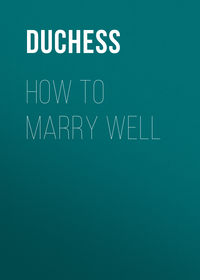 полная версия
полная версияMrs. Geoffrey
"Call off that dog," cries Geoffrey, turning savagely to Mona. Whereupon, having gained her purpose, Mona bids the dog lie down, and the faithful brute, exquisitely trained, and unequal to disobedience, drops off his foe at her command and falls crouching to the ground, yet with his eyes red and bloodshot, and his breath coming in parting gasps that betray the wrath he would gladly gratify.
The dagger has fallen to the carpet in the struggle, and Mona, picking it up, flings it far from her into the darksome night through the window. Then she goes up to Geoffrey, and laying her hand upon his breast, turns to confront their cousin.
Her hair is falling like a veil all round her; through it she looks out at Rodney with eyes frightened and imploring.
"Go, Paul!" she says, with vehement entreaty, the word passing her lips involuntarily.
Geoffrey does not hear her. Paul does. And as his own name, coming from her lips, falls upon his ear, a great change passes over his face. It is ashy pale; his lips are bloodless; his eyes are full of rage and undying hatred: but at her voice it softens, and something that is quite indescribable, but is perhaps pain and grief and tenderness and despair combined, comes into it. Her lips – the purest and sweetest under heaven – have deigned to address him as one not altogether outside the pale of friendship, – of common fellowship. In her own divine charity and tenderness she can see good in others who are not (as he acknowledges to himself with terrible remorse) worthy to touch the very hem of her white skirts.
"Go," she says, again, entreatingly, still with her hand on Geoffrey's breast, as though to keep him back, but with her eyes on Paul.
It is a command. With a last lingering glance at the woman who has enthralled him, he steps out through the window on to the balcony, and in another moment is lost to sight.
Mona, with a beating heart, but with a courage that gives calmness to her outward actions, closes the window, draws the shutters together, bars them, and then goes back to Geoffrey, who has not moved since Rodney's departure.
"Tell me again how it all happened," he says, laying his hands on her shoulders. And then she goes through it again, slowly, carefully.
"He was standing just there," she says, pointing to the spot where first she had seen Paul when she entered the library, "with his face turned to the panels, and his hand up like this," suiting the action to the word. "When I came in, he turned abruptly. Can he be eccentric? – odd? Sometimes I have thought that – "
"No; eccentricity is farther from him than villainy. But, my darling, what a terrible ordeal for you to come in and find him here! Enough to frighten you to death, if you were any one but my own brave girl."
"The dogs gave me courage. And was it not well I did bring them? How strange that I should have wished for them so strongly to-night! That time when he drew out the dagger! – my heart failed me then, and but for Spice what would have been the end of it?" She shudders. "And yet," she says, with sudden passion, "even then I knew what I should have done. I had his pistol. I myself would have shot him, if the worst came to the worst. Oh, to think that that man may yet reign here in this dear old house, and supplant Nicholas!"
Her eyes fill with tears.
"He may not, – there is a faint chance, – but of course the title is gone, as he has proved his birth beyond dispute."
"What could he have wanted? When I came in, he turned pale and levelled the pistol at me. I was frightened, but not much. When I desired him, he laid down the pistol directly, and then I seized it. And then – "
Her eyes fall upon the hearthrug. Half under the fender a small piece of crumpled paper attracts her notice. Still talking, she stoops mechanically and picks it up, smooths it, and opens it.
"Why, what is this?" she says, a moment later; "and what a curious hand! Not a gentleman's surely."
"One of Thomas's billet-doux, no doubt," says Geoffrey, dreamily, alluding to the under-footman, but thinking of something else.
"No, no; I think not. Come here, Geoffrey; do. It is the queerest thing, – like a riddle. See!"
He comes to her and looks over her shoulder at the paper she holds. In an ugly unformed hand the following figures and words are written upon it, —
"7 – 4. Press top corner, – right hand."
This is all. The paper is old, soiled, and has apparently made large acquaintance with pockets. It looks, indeed, as if much travel and tobacco are not foreign to it. Geoffrey, taking it from Mona, holds it from him at full length, with amiable superciliousness, between his first finger and thumb.
"Thomas has plainly taken to hieroglyphics, – if it be Thomas," he says. "I can fancy his pressing his young woman's right hand, but her 'top corner' baffles me. If I were Thomas, I shouldn't hanker after a girl with a 'top corner;' but there is no accounting for tastes. It really is curious, though, isn't it?" As he speaks he looks at Mona; but Mona, though seemingly returning his gaze, is for the first time in her life absolutely unmindful of his presence.
Slowly she turns her head away from him, and, as though following out a train of thought, fixes her eyes upon the panelled wall in front of her.
"It is illiterate writing, certainly; and the whole concern dilapidated to the last degree," goes on Rodney, still regarding the soiled paper with curiosity mingled with aversion. "Any objection to my putting it in the fire?"
"'7 – 4,'" murmurs she, absently, still staring intently at the wall.
"It looks like the production of a lunatic, – a very dangerous lunatic, – an habitue of Colney Hatch," muses Geoffrey, who is growing more and more puzzled with the paper's contents the oftener he reads it.
"'Top corner, – right hand,'" goes on Mona, taking no heed of him, and speaking in the same low, mysterious, far-off tone.
"Yes, exactly; you have it by heart; but what does it mean, and what are you staring at that wall for?" asks he, hopelessly, going to her side.
"It means – the missing will," returns she, in a voice that would have done credit to a priestess of Delphi. As she delivers this oracular sentence, she points almost tragically towards the wall in question.
"Eh!" says Geoffrey, starting, not so much at the meaning of her words as at the words themselves. Have the worry and excitement of the last hour unsettled her brain!
"My dear child, don't talk like that," he says, nervously: "you're done up, you know. Come to bed."
"I sha'n't go to bed at all," declares Mrs. Geoffrey, excitedly. "I shall never go to bed again, I think, until all this is cleared up. Geoffrey, bring me over that chair."
She motions impatiently with her hand, and Geoffrey, being compelled to it by her vehemence, draws a high chair close to that part of the wall that seems to have claimed her greatest attention.
Springing up on it, she selects a certain panel, and, laying one hand on it as if to make sure it is the one she wants, counts carefully six more from it to the next wall, and three from it to the floor. I think I have described these panels before as being one foot broad and two feet long.
Having assured herself that the panel selected is the one she requires, she presses her fingers steadily against the upper corner on the side farthest from the fire. Expectation lies in every line of her face, yet she is doomed to disappointment. No result attends her nervous pressure, but distinct defeat. The panel is inexorable. Nothing daunted, she moves her hand lower down, and tries again. Again failure crushes her; after which she makes one last attempt, and, touching the very uppermost corner, presses hard.
Success at last rests with her. Slowly the panel moves, and, sliding to one side, displays to view a tiny cupboard that for many years has been lost sight of by the Rodney family. It is very small, about half a foot in depth, with three small shelves inside. But, alas! these shelves are empty.
Geoffrey utters an exclamation, and Mona, after one swift comprehensive glance at the rifled cupboard, bursts into tears. The bitter disappointment is more than she can bear.
"Oh! it isn't here! He has stolen it!" cries she, as one who can admit of no comfort. "And I felt so sure I should find it myself. That was what he was doing when I came into the room. Ah, Geoffrey, sure you didn't malign him when you called him a thief."
"What has he done?" asks Geoffrey, somewhat bewildered and greatly distressed at her apparent grief.
"He has stolen the will. Taken it away. That paper you hold must have fallen from him, and contains the directions about finding the right panel. Ah! what shall we do now?"
"You are right: I see it now," says Geoffrey, whitening a little, "Warden wrote that paper, no doubt," glancing at the dirty bit of writing that has led to the discovery. "He evidently had his knowledge from old Elspeth, who must have known of this secret hiding-place from my great-grandfather. My father, I am convinced, knew nothing of it. Here, on the night of my grandfather's death, the old woman must have hidden the will, and here it has remained ever since until to-night. Yet, after all, this is mere supposition," says Geoffrey. "We are taking for granted what may prove a myth. The will may never been placed here, and he himself – "
"It was placed here; I feel it, I know it," says Mona, solemnly, laying her hand upon the panel. Her earnestness impresses him. He wakes into life.
"Then that villain, that scoundrel, has it now in his possession," he says, quickly. "If I go after him, even yet I may come up with him before he reaches his home, and compel him to give it up."
As he finishes he moves towards the window, as though bent upon putting his words into execution at once, but Mona hastily stepping before him, gets between it and him, and, raising her hand, forbids his approach.
"You may compel him to murder you," she says, feverishly, "or, in your present mood, you may murder him. No, you shall not stir from this to-night."
"But – " begins he, impatiently, trying gently to put her to one side.
"I will not listen," she interrupts, passionately. "I know how you both looked a while ago. I shall never forget it; and to meet again now, with fresh cause for hatred in your hearts, would be – No. There is crime in the very air of to-night."
She winds her arms, around him, seeing he is still determined to go, and, throwing back her head, looks into his face.
"Besides, you are going on a fool's errand," she says, speaking rapidly, as though to gain time. "He has reached his own place long ago. Wait until the morning, I entreat you, Geoffrey. I – " her lips tremble, her breath comes fitfully – "I can bear no more just now."
A sob escapes her, and falls heavily on Geoffrey's heart. He is not proof against a woman's tears, – as no true man ever is, – especially her tears, and so he gives in at once.
"There, don't cry, and you shall have it all your own way," he says, with a sigh. "To-morrow we will decide what is to be done."
"To-day, you mean: you will only have to wait a few short hours," she says, gratefully. "Let us leave this hateful room," with a shudder. "I shall never be able to enter it again without thinking of this night and all its horrors."
CHAPTER XXXII
HOW MONA KEEPS HER OWN COUNSEL – AND HOW AT MIDDAY SHE RECEIVES A NOTE
Sleep, even when she does get to bed, refuses to settle upon Mona's eyelids. During the rest of the long hours that mark the darkness she lies wide awake, staring upon vacancy, and thinking ceaselessly until
"Morn, in the white wake of the morning star,Comes furrowing all the Orient into gold."Then she rises upon her elbow, and notices how the light comes through the chinks of the shutters. It must be day indeed. The dreary night has fled affrighted; the stars hide their diminished rays. Surely
"Yon gray linesThat fret the clouds are messengers of day."There is relief in the thought. She springs from her bed, clothes herself rapidly, and descends to the breakfast room. Yet the day thus begun appears to her singularly unattractive. Her mind is full of care. She has persuaded Geoffrey to keep silence about all that last night produced, and wait, before taking further steps. But wait for what? She herself hardly knows what it is she hopes for.
She makes various attempts at thinking it out. She places her pretty hands upon her prettier brows, under the mistaken impression common to most people that this attitude is conducive to the solution of mysteries; but with no result. Things will not arrange themselves.
To demand the will from Paul Rodney without further proof that it is in his possession than the fact of having discovered by chance a secret cupboard is absurd; yet not to demand it seems madness. To see him, to reason with him, to accuse him of it, is her one desire; yet she can promise herself no good from such an interview. She sighs as she thus seeks aimlessly to see a satisfactory termination to all her meditations.
She is distraite and silent all the morning, taking small notice of what goes on around her. Geoffrey, perplexed too, in spirit, wanders vaguely from pillar to post, unable to settle to anything, – bound by Mona to betray no hint of what happened in the library some hours ago, yet dying to reveal the secret of the panel-cupboard to somebody.
Nolly is especially and oppressively cheerful. He is blind to the depression that marks Mona and Geoffrey for its own, and quite outdoes himself in geniality and all-round amiability.
Violet has gone to the stables to bestow upon her bonny brown mare her usual morning offering of bread; Jack, of course, has gone with her.
Geoffrey is nowhere just at this moment. Doatie and Nicholas are sitting hand in hand and side by side in the library, discussing their own cruel case, and wondering for the thousandth time whether – if the worst comes to the worst (of which, alas! there now seems little doubt) – her father will still give his consent to their marriage, and, if so, how they shall manage to live on five hundred pounds a year, and whether it may not be possible for Nicholas to get something or other to do (on this subject they are vague) that may help "to make the crown a pound."
Mona is sitting in the morning-room, the faithful and ever lively Nolly at her side. According to his lights, she is "worth a ship-load of the whole lot," and as such he haunts her. But to-day she fails him. She is absent, depressed, weighed down with thought, – anything but congenial. She forgets to smile in the right place, says, "Yes" when courtesy requires "No," and is deaf to his gayest sallies.
When he has told her a really good story. – quite true, and all about the æsthetic, Lady Lilias, who has declared her intention of calling this afternoon, and against whose wearing society he is strenuously warning her, – and when she has shown no appreciation of the wit contained therein, he knows there is something – as he himself describes it – "rotten in the state of Denmark."
"You are not well, are you, Mrs. Geoffrey?" he says, sympathetically, getting up from his own chair to lean tenderly over the back of hers. Nolly is nothing if not affectionate, where women are concerned. It gives him no thought or trouble to be attentive to them, as in his soul he loves them all, – in the abstract, – from the dairymaid to the duchess, always provided they are pretty.
"You are wrong: I am quite well," says Mona, smiling, and rousing herself.
"Then you have something on your mind. You have not been your usual perfect self all the morning."
"I slept badly last night; I hardly slept at all," she says, plaintively, evading direct reply.
"Oh, well, that's it," says Mr. Darling, somewhat relieved. "I'm an awful duffer not to have guessed that Geoffrey's being out would keep you awake."
"Yes, I could not sleep. Watching and waiting destroy all chance of slumber."
"Lucky he," says Nolly, fervently, "to know there is somebody who longs for his return when he is abroad; to feel that there are eyes that will mark his coming, and look brighter when he comes, and all that sort of thing. Nobody ever cares about my coming," says Mr. Darling, with deep regret, "except to lament it."
"How melancholy!" says Mona, with a nearer approach to brightness than she has shown all day.
"Yes. I'm not much," confesses Mr. Darling, blandly. "Others are more fortunate. I'm like 'the man in the street,' subject to all the winds of heaven. Why, it would almost tempt a man to stay away from home occasionally to know there was some one longing for his return. It would positively encourage him to dine out whenever he got the chance."
"I pity your wife," says Mona, almost severely.
"Oh, now, Mrs. Geoffrey, come – I say – how cruel yon can be!"
"Well, do not preach such doctrine to Geoffrey," she says, with repentance mixed with pathos.
"I shall do only what you wish," returns he, chivalrously, arranging the cushion that adorns the back of her chair.
The morning wanes, and luncheon declares itself. When it has come to an end, Mona going slowly up the stairs to her own room is met there by one of the maids, – not her own, – who hands her a sealed note.
"From whom?" demands Mona, lazily, seeing the writing is unknown to her.
"I really don't know, ma'am. Mitchell gave it to me," says the girl, in an injured tone. Now, Mitchell is Lady Rodney's maid.
"Very good," says Mona, indifferently, after which the woman, having straightened a cushion or two, takes her departure.
Mona, sinking languidly into a chair, turns the note over and over between her fingers, whilst wondering in a disjointed fashion as to whom it can be from. She guesses vaguely at the writer of it, as people will when they know a touch of the hand and a single glance can solve the mystery.
Then she opens the letter, and reads as follows:
"In spite of all that has passed, I do entreat you to meet me at three o'clock this afternoon at the river, beneath the chestnut-tree. Do not refuse. Let no shrinking from the society of such as I am deter you from granting me this first and last interview, as what I have to say concerns not you, but those you love. I feel the more sure you will accede to this request because of the heavenly pity in your eyes last night, and the grace that moved you to address me as you did. I shall wait for you until four o'clock. But let me not wait in vain. – P. R."
So runs the letter.
"The man is eccentric, no matter what Geoffrey may say," is Mona's first thought, when she has perused it carefully for the second time. Then the belief that it may have something to do with the restoration of the lost will takes possession of her, and makes her heart beat wildly. Yes, she will go; she will keep this appointment whatever comes of it.
She glances at her watch. It is now a quarter past three; so there is no time to be lost. She must hasten.
Hurriedly she gets into her furs, and, twisting some soft black lace around her throat, runs down the stairs, and, opening the hall door without seeing any one, makes her way towards the appointed spot.
It is the 20th of February; already winter is dying out of mind, and little flowers are springing everywhere.
"Daisies pied, and violets blue,And lady-smocks all silver white,And cuckoo-buds of yellow hueDo paint the meadows with delight."Each bank and root of mossy tree is studded with pale primroses that gleam like stars when the morning rises to dim their lustre. My lady's straw-bed spreads its white carpet here and there; the faint twitter of birds is in the air, with "liquid lapse of murmuring streams;" every leaf seems bursting into life, the air is keen but soft, the clouds rest lightly on a ground of spotless blue; the world is awake, and mad with youthful glee as
"Spring comes slowly up this way"Every flower has opened wide its pretty eye, because the sun, that so long has been a stranger, has returned to them, and is gazing down upon them with ardent love. They – fond nurslings of an hour – accept his tardy attentions, and, though, still chilled and desolee because of the sad touches of winter that still remain, gaze with rapt admiration at the great Ph[oe]bus, as he sits enthroned above.
Mona, in spite of her haste, stoops to pluck a bunch of violets and place them in her breast, as she goes upon her way. Up to this the beauty of the early spring day has drawn her out of herself, and compelled her to forget her errand. But as she comes near to the place appointed for the interview, a strange repugnance to go forward and face Paul Rodney makes her steps slower and her eyes heavy. And even as she comprehends how strongly she shrinks from the meeting with him, she looks up and sees the chestnut-tree in front of her, and the stream rushing merrily to the ocean, and Paul Rodney standing in his favorite attitude with his arms folded and his sombre eyes fixed eagerly upon her.
"I have come," she says, simply, feeling herself growing pale, yet quite self-possessed, and strong in a determination not to offer him her hand.
"Yes. I thank you for your goodness," returns he, slowly.
Then follows an uncomfortable silence.
"You have something important to say to me," says Mona, presently, seeing he will not speak: "at least, so your letter led me to believe."
"It is true; I have." Then some other train of thought seems to rush upon him; and he goes on in a curious tone that is half mocking, yet wretched above every other feeling; "You had the best of me last night, had you not? And yet," with a sardonic laugh. "I'm not so sure, either. See here."
Slowly he draws from his pocket a paper, folded neatly, that looks like some old parchment. Mona draws her breath quickly, and turns first crimson with emotion, then pale as death. Opening it at a certain page, he points out to her the signature of George Rodney, the old baronet.
"Give it to me!" cries she, impulsively, her voice, trembling. "It is the missing will. You found it last night. It belongs to Nicholas. You must – nay," softly, beseechingly, "you will give it to me."
"Do you know all you ask? By relinquishing this iniquitous deed I give up all hope of ever gaining this place, – this old house that even to me seems priceless. You demand much. Yet on one condition it shall be yours."
"And the condition?" asks she, eagerly, going closer to him. What is it that she would not do to restore happiness to those she has learned to love so well?
"A simple one."
"Name it!" exclaims she, seeing he still hesitates.
He lays his hands lightly on her arm, yet his touch seems to burn through her gown into her very flesh. He stoops towards her.
"For one kiss this deed shall be yours," he whispers, "to do what you like with it."
Mona starts violently, and draws back; shame and indignation cover her. Her breath comes in little gasps.
"Are you a man, to make me such a speech?" she says, passionately, fixing her eyes upon him with withering contempt.
"You have heard me," retorts he, coldly, angered to the last degree by the extreme horror and disgust she has evinced at his proposal. He deliberately replaces the precious paper in his pocket, and turns as if to go.
"Oh, stay?" she says, faintly, detaining him both by word and gesture.
He turns to her again.
She covers her eyes with her hands, and tries vainly to decide on what is best for her to do. In all the books she has ever read the young woman placed in her position would not have hesitated at all. As if reared to the situation, she would have thrown up her head, and breathing defiance upon the tempter, would have murmured to the sympathetic air, "Honor above everything," and so, full of dignity, would have moved away from her discomfited companion, her nose high in the air. She would think it a righteous thing that all the world should suffer rather than one tarnish, however slight, should sully the brightness of her fame.
For the first time Mona learns she is not like this well-regulated young woman. She falls lamentably short of such excellence. She cannot bring herself to think the world of those she loves well lost for any consideration whatever. And after all – this horrid condition – it would be over in a moment. And she could run home with the coveted paper, and bathe her face in sweet cold water. And then again she shudders. Could she bathe the remembrance of the insult from her heart?









